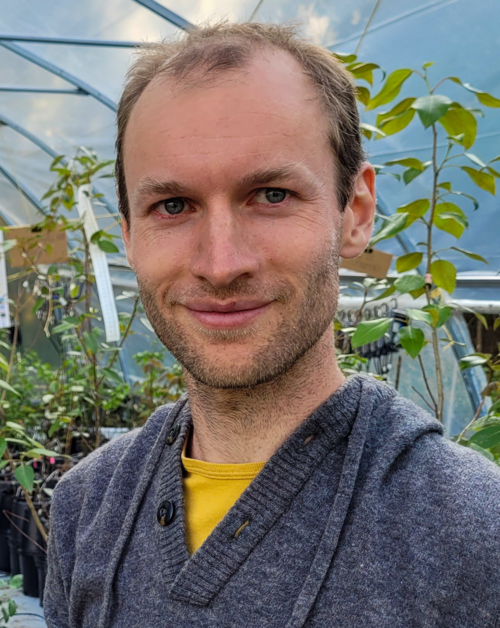Research Interest
Timing in ecology is (almost) everything. I was trained to see the world through the lens of phenology. Initially, the bud was my main focus, studying the drivers of dormancy break and leaf emergence until bud set and senescence. Soon thereafter, other meristems captured my interest too, and I became fascinated by their interplay and how they are controlled, both internally and externally. At what point in the season should a tree switch from acquisitive vegetative growth to reproduction and tissue maturation? How plastic are tree species in shifting and stretching their life cycle events in response to a changing climate, with increased environmental stress but also potentially longer growing seasons? These and similar questions I am currently addressing with artificial experimental settings as well as at the Swiss Canopy Crane II site in Hölstein.
Main research topics
- Phenology of various physiological activities
- Internal and external control mechanisms of meristems
- Dormancy regulation
- Sink-source relationships
- Drought limits of trees at the dry edge
Education and Professional Experience
2025-ongoing Senior scientist, Physiological Plant Ecology group, University of Basel
2023-2024 Postdoc in Temporal Ecology, Research group Prof. Elizabeth Wolkovich, University of British Columbia
2018-2022 Ph.D. in Ecosystem Ecology, ETH Zurich, WSL Birmensdorf, Research group Prof Arthur Gessler
2015 Statistician and field employee, Hintermann & Weber AG
2013-2014 MSc in Ecology, University of Basel, Institute of Botany
2009-2012 BSc in Biology, Major in Animal and Plant Biology, University of Basel
Project
2025-ongoing Swiss Canopy Crane II project - SCCII (scientific and technical coordinator)
2022-ongoing Influence of the timing of stress and stimuli on growth performance, phenological development and survival of temperate trees (postdoc.mobility)
2021-2024 PhenoRangers: Swiss rangers as professional mediators between scientists and the public: launching an interactive phenology network to spread awareness of how climate change is affecting forest ecosystems (Agora-Project; Co-PI).
Key Publications
Vitasse, Y., Pohl, N., Walde, M. G., Nadel, H., Gossner, M. M., Baumgarten, F. (2023) Feasting on the
ordinary or starving for the exceptional in a warming climate: Phenological synchrony
between spongy moth (Lymantria dispar) and budburst of six European tree species.
Ecology and Evolution.
https://doi.org/10.1002/ece3.10928
Baumgarten, F., Gessler, A., Vitasse, Y. (2022) No risk – no fun: penalty and recovery from spring
frost damages in deciduous temperate trees. Functional Ecology.
https://doi.org/10.1111/1365-2435.14243
Vitasse, Y., Baumgarten, F., Zohner, Rutishauser, T., Pietragalla, B., Gehrig, R., Dai, J., Wang,
H., Aono, Y., Sparks, T.H. (2022) The great acceleration of plant phenological shifts. Nature
Climate Change.
https://doi.org/10.1038/s41558-022-01283-y
Walde, M. G., Wu, Z., Fox, T. Baumgarten, F., Fu, Y. H., Vitasse, Y. (2022) Higher spring phenological
sensitivity to forcing temperatures of Asian compared to European tree species under
low and high pre-chilling conditions. Frontiers in Forests and Global Change.
https://doi.org/10.3389/ffgc.2022.1063127
Vitasse, Y., Baumgarten, F., Zohner, C. M., Kaewthongrach, R., Fu, Y. H., Walde, M. G., & Moser,
B. (2021) Impact of microclimatic conditions and resource availability on spring and autumn
phenology of temperate tree seedlings. New Phytologist.
https://doi.org/10.1111/nph.17606
Baumgarten, F., Zohner, C. M., Gessler, A., Vitasse, Y. (2021) Chilled to be forced: the best dose to
wake up buds from winter dormancy. New Phytologist.
https://doi.org/10.1111/nph.17270
Zohner, C. M. et al. (2019) Late-spring frost risk between 1959 and 2017 decreased in North America but
increased in Europe and Asia. Proceedings of the National Academy of Sciences.
https://doi.org/10.1073/pnas.1920816117
Quick Links

